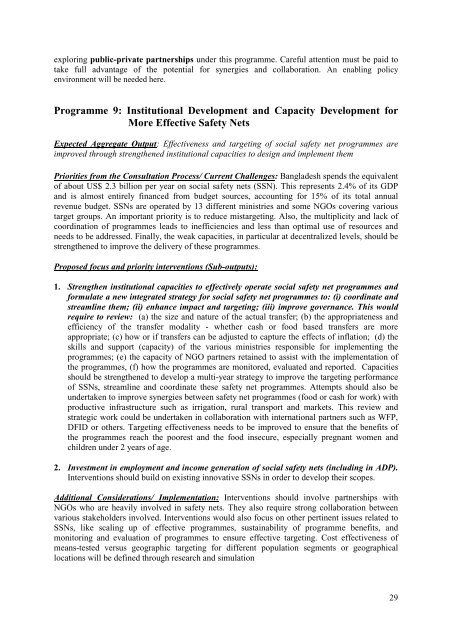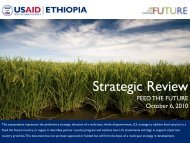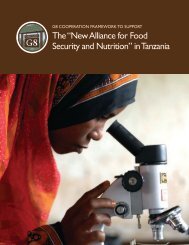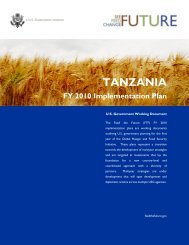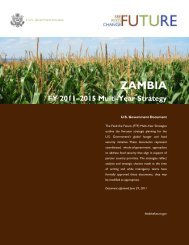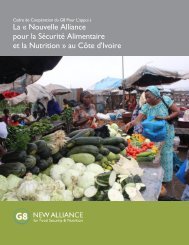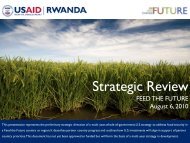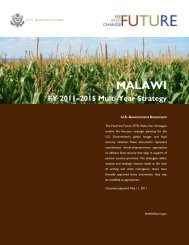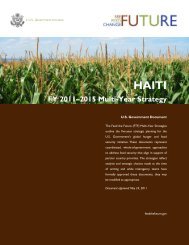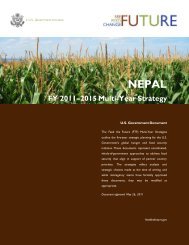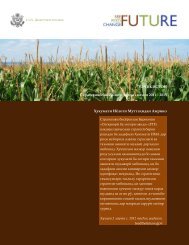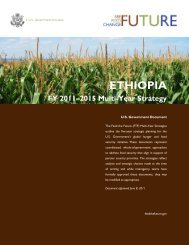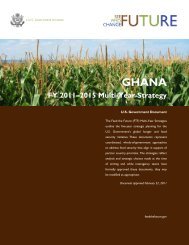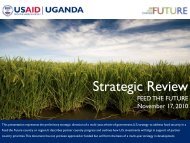Bangladesh Country Investment Plan - Feed the Future
Bangladesh Country Investment Plan - Feed the Future
Bangladesh Country Investment Plan - Feed the Future
You also want an ePaper? Increase the reach of your titles
YUMPU automatically turns print PDFs into web optimized ePapers that Google loves.
exploring public-private partnerships under this programme. Careful attention must be paid to<br />
take full advantage of <strong>the</strong> potential for synergies and collaboration. An enabling policy<br />
environment will be needed here.<br />
Programme 9: Institutional Development and Capacity Development for<br />
More Effective Safety Nets<br />
Expected Aggregate Output: Effectiveness and targeting of social safety net programmes are<br />
improved through streng<strong>the</strong>ned institutional capacities to design and implement <strong>the</strong>m<br />
Priorities from <strong>the</strong> Consultation Process/ Current Challenges: <strong>Bangladesh</strong> spends <strong>the</strong> equivalent<br />
of about US$ 2.3 billion per year on social safety nets (SSN). This represents 2.4% of its GDP<br />
and is almost entirely financed from budget sources, accounting for 15% of its total annual<br />
revenue budget. SSNs are operated by 13 different ministries and some NGOs covering various<br />
target groups. An important priority is to reduce mistargeting. Also, <strong>the</strong> multiplicity and lack of<br />
coordination of programmes leads to inefficiencies and less than optimal use of resources and<br />
needs to be addressed. Finally, <strong>the</strong> weak capacities, in particular at decentralized levels, should be<br />
streng<strong>the</strong>ned to improve <strong>the</strong> delivery of <strong>the</strong>se programmes.<br />
Proposed focus and priority interventions (Sub-outputs):<br />
1. Streng<strong>the</strong>n institutional capacities to effectively operate social safety net programmes and<br />
formulate a new integrated strategy for social safety net programmes to: (i) coordinate and<br />
streamline <strong>the</strong>m; (ii) enhance impact and targeting; (iii) improve governance. This would<br />
require to review: (a) <strong>the</strong> size and nature of <strong>the</strong> actual transfer; (b) <strong>the</strong> appropriateness and<br />
efficiency of <strong>the</strong> transfer modality - whe<strong>the</strong>r cash or food based transfers are more<br />
appropriate; (c) how or if transfers can be adjusted to capture <strong>the</strong> effects of inflation; (d) <strong>the</strong><br />
skills and support (capacity) of <strong>the</strong> various ministries responsible fo r implementing <strong>the</strong><br />
programmes; (e) <strong>the</strong> capacity of NGO partners retained to assist with <strong>the</strong> implementation of<br />
<strong>the</strong> programmes, (f) how <strong>the</strong> programmes are monitored, evaluated and reported. Capacities<br />
should be streng<strong>the</strong>ned to develop a multi-year strategy to improve <strong>the</strong> targeting performance<br />
of SSNs, streamline and coordinate <strong>the</strong>se safety net programmes. Attempts should also be<br />
undertaken to improve synergies between safety net programmes (food or cash for work) with<br />
productive infrastructure such as irrigation, rural transport and markets. This review and<br />
strategic work could be undertaken in collaboration with international partners such as WFP,<br />
DFID or o<strong>the</strong>rs. Targeting effectiveness needs to be improved to ensure that <strong>the</strong> benefits of<br />
<strong>the</strong> programmes reach <strong>the</strong> poorest and <strong>the</strong> food insecure, especially pregnant women and<br />
children under 2 years of age.<br />
2. <strong>Investment</strong> in employment and income generation of social safety nets (including in ADP).<br />
Interventions should build on existing innovative SSNs in order to develop <strong>the</strong>ir scopes.<br />
Additional Considerations/ Implementation: Interventions should involve partnerships with<br />
NGOs who are heavily involved in safety nets. They also require strong collaboration between<br />
various stakeholders involved. Interventions would also focus on o<strong>the</strong>r pertinent issues related to<br />
SSNs, like scaling up of effective programmes, sustainability of programme benefits, and<br />
monitoring and evaluation of programmes to ensure effective targeting. Cost effectiveness of<br />
means-tested versus geographic targeting for different population segments or geographical<br />
locations will be defined through research and simulation<br />
29


